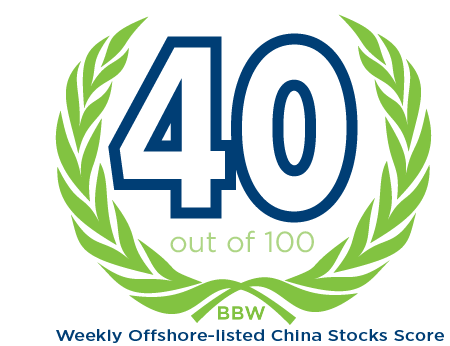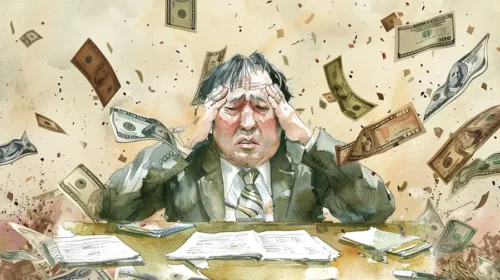CHINA BULLETIN: Next Stop, Deflation


In this week’s issue China slips into deflation, Chinese tour groups return to U.S. and a major property developer defaults. On a scale of 1 to 100, we give the week a 40 for offshore-listed China stocks.
Doug Young, Editor in Chief
You can sign up to get China Bulletin weekly in your inbox.
MACRO
Next Stop, Deflation
New trade and bank loan data are casting the latest gloomy shadows over China’s economy. But the most worrisome economic indicator last week was the latest consumer price index (CPI) that showed China has entered deflation. The CPI’s 0.3% decline in July marked China’s first time in deflationary territory in two years, and had economists alarmed at the potential implications.
Trade data released last week also showed that exports tumbled 14.5% in July, their worst performance since the pandemic began, and new bank loans fell to their lowest level since 2009. The weak CPI and bank loans point to anemic domestic demand, while the export decline reflects falling overseas demand as the West diversifies its supply chains away from China.
U.S. Tightens Noose on China Tech Investment
Outside China, last week’s biggest news was a new executive order signed by Joe Biden restricting U.S. investment in Chinese startups from the microchip, quantum computing and AI sectors. The order applied to U.S. venture capital and private equity companies, and targeted their investments in tech companies whose products could have military applications.
The move was the latest by the U.S. to stymie development of certain key tech sectors that could assist in China’s military modernization. Other previous measures have included banning U.S. investors from buying certain Chinese stocks, and cutting off some Chinese companies from buying U.S.-made high-tech gear like chip-design software and manufacturing equipment.
China Stocks Decline for Second Week
Chinese stocks finally broke their see-saw performance of “up one week, down the next” from the last two months, but the news wasn’t good. All three of our major indexes fell for a second consecutive week, with the Hang Seng China Enterprises Index losing 2.8%, while the iShares MSCI China ETF fell 4.4%. The broader Hang Seng Index also fell 2.4%.
We attributed the previous “see-saw effect” to investor indecision on which way China might go. Gloom usually reflected the latest weak economic indicators, while rallies reflected new signs of more aggressive government economic stimulus measures. Two down weeks hardly makes a trend, though it does seem like the naysayers may be getting the upper hand.

Industry
Pharma Sector at Center of New Crackdown
Anyone who thought the era of crackdowns was in the past might need to think again. Last week we flagged a report saying China was preparing for a crackdown on its young and somewhat unruly pharma sector, and now two new reports are highlighting how that campaign could unfold.
One says Chinese authorities have uncoveredpotential systemic corruption in the sector in Guangdong, while another points out that many companies are starting to shelve IPO plans after coming under government scrutiny. Truth be told, this sector has developed very quickly and mostly consists of money-losing, cash-burning companies, so such a clean-up might be overdue.
Next Stop, U.S., Japan and South Korea
More than eight months after lifting most of its pandemic restrictions, China has given the green light for Chinese tourists to return en masse to the U.S., Japan, South Korea and Australia. Those four were on a list of countries that can now receive groups of Chinese tourists. It’s the third such “batch” of countries to get such approval since China retired its “zero Covid” policy.
Chinese were all but banned from going abroad during most of the pandemic, with people allowed out only for critical business. Outbound tourism resumed this year, but most such travel was initially limited to individuals rather than the tour groups that many Chinese prefer. Part of the problem was lack of international flights, which still remain well below pre-pandemic levels.
Banks Balk at Latest Property-Boosting Program
A headline last week spotlighted the tensions that are arising as Beijing “suggests” measure after measure that state-run banks could take to help revive the country’s ailing property market. In this case, Beijing has encouraged the banks to lower interest rates for existing home mortgages – something that would be unthinkable in other parts of the world where most banks are private.
Not surprisingly, the banks are pushing back by dragging their feet on this piece of government “guidance,” which is basically asking them to sacrifice profits to help the market. All the government policy incentives are undoubtedly dampening banks’ profits, possibly pushing some of the weaker ones into the red.

Company
Another Major Developer Defaults
Move over, Evergrande. Country Garden has become China’s latest major property developer to default on its debt, in what was easily the biggest Chinese corporate story last week. Specifically, the company failed to make a $22.5 million interest payment that was due last week, though it technically has a one-month grace period before the default becomes official.
Everyone is now waiting to see if Country Garden will find a way to make the payment within the grace period. There were already signals towards the end of last week that the cash-strapped company might somehow “find” the funds, almost certainly with government assistance. But any fix will only be temporary, as Country Garden has a whopping $200 billion in outstanding debt.
Global Law Giant Hives Off China Business
The other major corporate story last week saw Dentons, the biggest foreign law firm in China by headcount, formally separate its Chinese business from its operations in the rest of the world. The firm informed clients of the move in a memo, explaining it was taking the step due to the “evolving regulatory environment for Chinese law firms.”
Foreign law firms have complained for years about their exclusion from many facets of doing legal business in China due to their overseas roots. This move could address that. But more importantly, many foreign firms are increasingly uneasy about China’s classification of some of their activities involving data gathering as “spying,” which presents them with a major business risk.
Wanda Execs Under Investigation
Our third top corporate story of the week takes us back to the property sector, this time with a report that three senior executives from former highflyer Wanda were taken away by police earlier this month for investigation. That usually signals the individuals or companies, or sometimes both, are suspected of corruption.
This particular story isn’t too surprising, since China regularly cracks down on officials from the government and big state-owned enterprises for suspected corruption. What’s unusual here is that Wanda is a private company, and also that it and many of its peers are currently struggling. That could signal a new front is coming in China’s decade-old anti-corruption crackdown.
AND FROM THE PAGES OF BAMBOO WORKS
| Fosun Tourism Rides Club Med Rebound Into Bumper Profits Last week we spotlighted the latest upside profit forecast from Fosun Tourism, which is bouncing back nicely thanks to ongoing “revenge spending” by global tourists. The forecast is the latest signal that the company’s core Club Med resort chain is doing quite well, with room prices currently averaging 30.6% above pre-pandemic levels from 2019. That underscores a story that’s been largely overshadowed by the pandemic, namely that Fosun appears to have revived Club Med some eight years after it purchased the chain that was showing rapid signs of aging at the time. With the pandemic now receding, Fosun could potentially resume its originally planned global expansion for the chain. |
| E-commerce Company Makes Lemonade from Crisis We also spotlighted a story that shows the kinds of antics that happen on China’s internet, and how one e-commerce Johnny-come-lately made lemonade from lemons after getting caught up in such shenanigans. The story involved East Buy, a former education company that recently shifted to e-commerce after its previous business was banned under a government crackdown. The company was doing brisk business using a channel on Douyin, the Chinese version of TikTok owned by ByteDance, which has its own e-commerce aspirations. When Douyin suddenly decided to suspend the channel for several days, East Buy used the crisis to attract big publicity to drive traffic to its own independent platform. |






